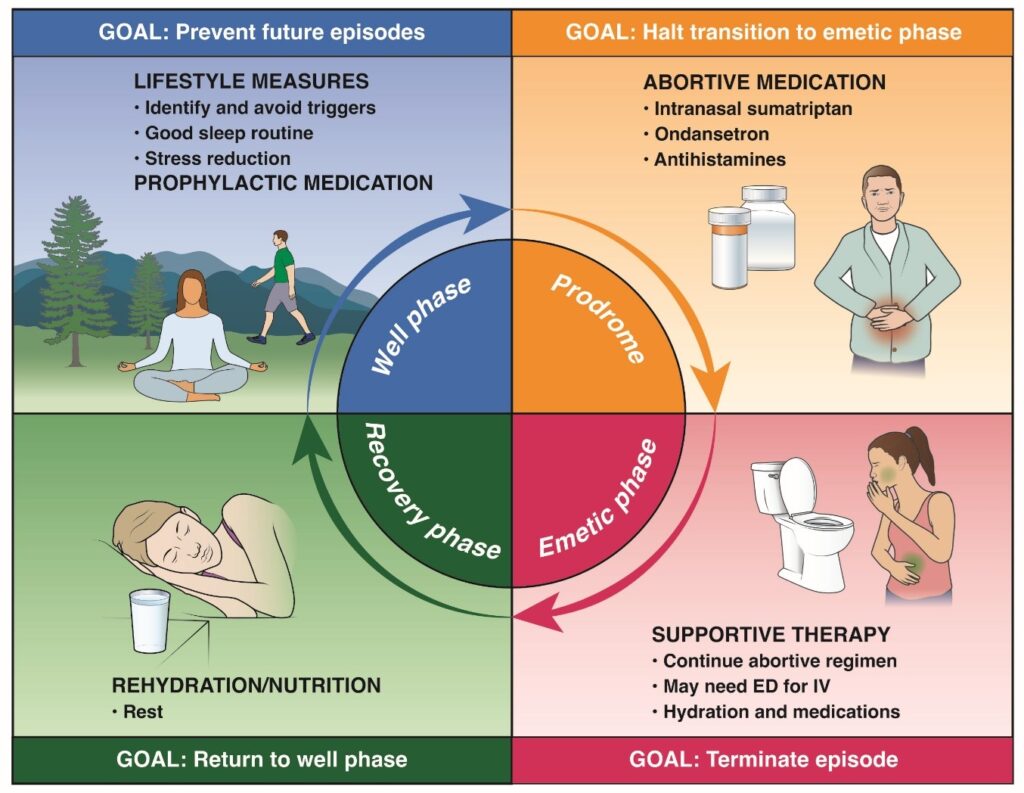Bethesda, MD (July 16, 2024) – The American Gastroenterological Association (AGA) has released new clinical guidance to help clinicians and patients recognize the signs and symptoms of cyclic vomiting syndrome (CVS). CVS is a common and disabling condition, affecting up to 2% of the population, but most patients experience years of delays in receiving a diagnosis and effective treatment. The AGA Clinical Practice Update was published today in Gastroenterology.
“A diagnosis is a powerful tool. Not only does it help patients make sense of debilitating symptoms, but it allows healthcare providers to create an effective treatment plan,” said author of the AGA Clinical Practice Update Dr. David Levinthal, director of the neurogastroenterology & motility center at the University of Pittsburgh Medical Center.
What is CVS?
Cyclic vomiting syndrome (CVS) is a chronic disorder of gut-brain interaction (DGBI) characterized by sudden episodes of intense nausea, vomiting and retching separated by episode-free periods.
CVS can be mild (less than 4 episodes/year lasting less than 2 days) or moderate-severe (more than 4 episodes/year lasting more than 2 days and requiring at least 1 emergency department visit or hospitalizations).
In patients with CVS, there is an absence of repetitive vomiting between episodes, but mild symptoms such as nausea, indigestion and occasional vomiting may be experienced.
While CVS can happen to anyone, it is more common in females and young adults. CVS is also more common in people who have a personal or family history of migraine headaches.
How is CVS diagnosed?
Experts urge patients dealing with chronic vomiting symptoms to advocate for themselves and ask their doctors about cyclical vomiting syndrome. Sharing a detailed history of past vomiting episodes is key to a diagnosis. Patients are commonly misdiagnosed with the stomach flu or food poisoning, but when these symptoms occur repeatedly AGA advises clinicians consider CVS as a potential diagnosis.
“CVS is diagnosed based on clinical criteria called the Rome criteria and avoiding excessive and unnecessary testing is crucial,” said Dr. Thangam Venkatesan, AGA Clinical Practice Update author and section director of neurogastroenterology and motility at the Ohio State University.
How can CVS be treated?
CVS can be managed by lifestyle modification (regular sleep and stress management) as well as with a combination of medications to both prevent and stop attacks.
CVS has four distinct phases – inter-episodic, prodromal, emetic and recovery — each of which is associated with a distinct treatment approach and management goal.

The stakes
Currently, half of patients with CVS utilize emergency department services at least annually, and one-third of patients with CVS become disabled by their condition. More timely diagnoses can prevent patients from experiencing these complications.
“Our goal with this Clinical Practice Update is to increase awareness of cyclical vomiting syndrome to reduce the diagnostic delay and increase patients’ access to treatment. We hope to reach primary care, ER and urgent care providers, who are on the frontlines interacting with CVS patients seeking care, especially during an attack,” added Dr. Levinthal.
Are you a patient looking for support and resources?
Please visit the Cyclical Vomiting Syndrome Association at https://www.cvsaonline.org/
AGA Media Contact: Mara Shapiro, Communications and Media Relations Manager, [email protected], 301-329-5709
About the AGA Institute
The American Gastroenterological Association is the trusted voice of the GI community. Founded in 1897, the AGA has grown to more than 16,000 members from around the globe who are involved in all aspects of the science, practice and advancement of gastroenterology. The AGA Institute administers the practice, research and educational programs of the organization. www.gastro.org
AGA is on Instagram.
Like AGA on Facebook.
Follow us on X @AmerGastroAssn
Check out our videos on YouTube.
Join AGA on LinkedIn.
About Gastroenterology
Gastroenterology is the most prominent journal in the field of gastrointestinal disease. As the official journal of the AGA Institute, Gastroenterology delivers up-to-date and authoritative coverage of both basic and clinical gastroenterology. Regular features include articles by leading authorities and reports on the latest treatments for diseases. Original research is organized by clinical and basic-translational content, as well as by alimentary tract, liver, pancreas, and biliary content. www.gastrojournal.org/












